
Does a market economy encourage or discourage music, literature, and the visual arts? Do economic forces of supply and demand help or harm the pursuit of creativity? This book seeks to redress the current intellectual and popular balance and to encourage a more favorable attitude toward the commercialization of culture that we associate with modernity. Economist Tyler Cowen argues that the capitalist market economy is a vital but underappreciated institutional framework for supporting a plurality of coexisting artistic visions, providing a steady stream of new and satisfying creations, supporting both high and low culture, helping consumers and artists refine their tastes, and paying homage to the past by capturing, reproducing, and disseminating it. Contemporary culture, Cowen argues, is flourishing in its various manifestations, including the visual arts, literature, music, architecture, and the cinema.
Successful high culture usually comes out of a healthy and prosperous popular culture. Shakespeare and Mozart were highly popular in their own time. Beethoven’s later, less accessible music was made possible in part by his early popularity. Today, consumer demand ensures that archival blues recordings, a wide array of past and current symphonies, and this week’s Top 40 hit sit side by side in the music megastore. High and low culture indeed complement each other.
Cowen’s philosophy of cultural optimism stands in opposition to the many varieties of cultural pessimism found among conservatives, neoconservatives, the Frankfurt School, and some versions of the political correctness and multiculturalist movements, as well as historical figures, including Rousseau and Plato. He shows that even when contemporary culture is thriving, it appears degenerate, as evidenced by the widespread acceptance of pessimism. He ends by considering the reasons why cultural pessimism has such a powerful hold on intellectuals and opinion-makers.

Cowen examines this cultural interaction between Mexico and the United States to see how globalization shapes the lives and the work of the artists and their families. The story of these three artists reveals that this exchange simultaneously creates economic opportunities for the artists, but has detrimental effects on the village.
A view of the daily village life of three artists connected to the larger art world, this book should be of particular interest to those in the fields of cultural economics, Latino studies, economic anthropology and globalization.

In a world where more people know who Princess Di was than who their own senators are, where Graceland draws more visitors per year than the White House, and where Michael Jordan is an industry unto himself, fame and celebrity are central currencies. In this intriguing book, Tyler Cowen explores and elucidates the economics of fame.
Fame motivates the talented and draws like-minded fans together. But it also may put profitability ahead of quality, visibility above subtlety, and privacy out of reach. The separation of fame and merit is one of the central dilemmas Cowen considers in his account of the modern market economy. He shows how fame is produced, outlines the principles that govern who becomes famous and why, and discusses whether fame-seeking behavior harmonizes individual and social interests or corrupts social discourse and degrades culture.
Most pertinently, Cowen considers the implications of modern fame for creativity, privacy, and morality. Where critics from Plato to Allan Bloom have decried the quest for fame, Cowen takes a more pragmatic, optimistic view. He identifies the benefits of a fame-intensive society and makes a persuasive case that however bad fame may turn out to be for the famous, it is generally good for society and culture.
READERS
Browse our collection.
PUBLISHERS
See BiblioVault's publisher services.
STUDENT SERVICES
Files for college accessibility offices.
UChicago Accessibility Resources
home | accessibility | search | about | contact us
BiblioVault ® 2001 - 2024
The University of Chicago Press









